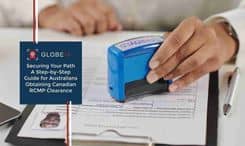State Apostille Services from USA
Apostille Services in California
Apostille Services in Texas
Apostille Services in Florida
Apostille Services in Washington
Services from Canada
Services from United Kingdom
Services from New Zealand

Navigating Canada Background Checks: A Comprehensive Guide
Unraveling the Canada Background Check Process
Significance of Canadian Background Checks
Background checks are used by both governments and employers to verify a person’s identity and look into their criminal records. Many Canadians moving abroad are asked by the governments of their destination countries to provide a background check. These types of checks are called certified criminal record checks and they are generated by the RCMP. An RCMP-issued criminal record clearance certificate serves as proof that you do not have any outstanding criminal offences in Canada. This aids the destination country’s immigration department in making a final decision on your application.Similarly, in the context of employment, background checks allow companies to uncover any criminal history that might be relevant to a candidate's suitability for a role. While a past criminal record does not automatically disqualify a candidate, it provides valuable context that helps employers weigh the risks and benefits associated with hiring decisions.
The Application of Canadian Background ChecksThe process of getting a background check in Canada is pretty simple if you have done your homework and know what you are looking for in the report. Here is a general list of steps that you need to follow:Step 1
The person being verified needs to provide their consent for the background check. This is very important in ensuring individual privacy and also protecting the general public’s data. You will need to submit your form by yourself if you are applying for a background check. Alternatively, you need to attach a signed consent form along with the background check request if you are an employer.Step 2
Basic information, such as the full name, date of birth, and correspondence address of the applicant is required. Additional details might also be needed depending on the type of check.Step 3
Next up is submitting the information to the RCMP for the background check process. There might be additional steps required here, which will depend on the specific type of check that is being requested.The time that it takes to generate results is dictated by the check type, any past criminal history matches, and the number of requests that the RCMP is handling during that month.
Types of Canada Background Checks
We have included the three main types of background checks in this section, with a brief introduction to each.
Basic CPIC Check
Basic CPIC (Canadian Police Information Centre) checks are name-based. This type of criminal record search is done through the RCMP's CPIC system. A CPIC check uses an individual's name and date of birth to look into their criminal history.Any information about convictions, for which the person has not been granted record suspension, will show up in the CPIC check. Examples of where this check type might be used are employment, internships, and diploma certifications.
This name and date of birth-based check is the fastest and least costliest of the three options, as it does not require fingerprinting to look into a person’s criminal background history.
Judicial Matters Check
Judicial Matters checks include a broader range of information as compared to CPIC checks. In addition to including non-suspended convictions, absolute and conditional discharges, arrest warrants, and outstanding charges are also included.Judicial matters checks provide a more detailed overview of a person’s background. They are used to vet volunteers, mid-level employees, and staff in the finance industry.
Judicial matters checks take a little more time than the simple background checks that we discussed in the previous section. However, they are still faster and more affordable as compared to certified criminal record checks.
Certified Criminal Record Check
This type of check is the most comprehensive of the three and reveals any criminal convictions associated with a person’s record. Certified criminal record checks are typically required for immigration, executive-level jobs and positions that involve working with children and the elderly.Name and date of birth-based checks are unreliable in these cases, as they do not cover a person’s entire criminal history. It is also highly likely that multiple people share the same name and date of birth. This leads to a lot of data that needs to be manually checked for any matches. In order to save time and organizational resources, these fingerprint-based checks are performed instead.
This eliminates the chances of any false positives and also gives the testing authority peace of mind that they have received a complete background record of their applicant.
Certified Criminal record checks take more time and cost more because the fingerprinting process is involved. The RCMP uses the c216c forms for receiving the applicant’s fingerprints.

Understanding Canada Background Check Processing Times
As discussed earlier, background check processing times in Canada depend on three key factors, with the main factor being the type of check that you request from the RCMP. While simple checks can often be completed within a few days, more comprehensive checks can take several weeks or even months before you hear back from the RCMP.
Factors Influencing Processing Times
Long background check processing times can cause uncertainty as you might be trying to meet an immigration or employment deadline. This is why we have identified the three main factors that can influence your background check’s processing times so that you can better understand how long it will take to get the results back. Let’s take a look at all three factors in detail.
Type of Background CheckThe kind of background check being requested significantly impacts the processing time. At Globeia, we provide an express Name and date of birth service for our Canadian clients. Your simple background check will be completed within an hour if your request is sent in during a workday. Similarly, Judicial Matters checks are also processed by our office on the same day that we receive your request.Certified criminal record checks, however, are different as they require digitization of your fingerprints before they can be sent to the RCMP. In the case of fingerprint-based checks, you can either visit our Toronto office in person or send in your completed c216c form by mail. We are accredited by the RCMP to digitize your fingerprints, as a Canadian fingerprinting company. The digital copy of your fingerprints is submitted to the RCMP’s office for the background check. They take anywhere between a few days to a couple of days to generate a certificate based on your details.
These are the general processing times that we provide to our clients at Globeia. Yours might take longer depending on the background verification company that you hire for your Canadian records check.
Individual's History
The applicant’s history can also dictate how long a background check takes. It may take the RCMP a bit longer to process your fingerprints if you have a criminal history or court orders related to your convictions. The Canada police check processing time might increase to 4 months if a criminal history is found by the RCMP.Volume of Requests
The RCMP is the only authority that can issue a Canadian Background check. This is why the processing time can increase based on the amount of requests that they have received from across the country. Similarly, your police clearance certificate might get delivered faster if there is a low volume of requests sent to the RCMP during that time of the year.Tips for Faster Processing
While you cannot control the above-mentioned factors, there are still some steps that you can take to make sure that your Canadian criminal history check takes as little time as possible.- Provide Accurate Information and ensure that there are no errors or omissions that can cause delays in your background check. The RCMP will either reject your request or ask for additional details, which can be avoided by double-checking your details while applying.
- It also helps to prepare in advance if you know you'll need a background check. Gathering your required documents and submitting your application in advance can help you complete the immigration or employment requirements on time. This is particularly important for criminal record checks, which can take several weeks or even months to process your fingerprints.
- Choose your background check company wisely. Always do your research and read up on different service providers before you pick one to help process your pre-employment or immigration background check.
How to Expedite A Canadian Police Check?
The RCMP uses Canada’s National Criminal Record repository to process background check requests. Professional fingerprinting companies can help you in getting expedited services. You cannot also directly submit your fingerprints to the RCMP from outside Canada, as its laws state that the fingerprinting process must be done inside Canada. So, you have to choose an accredited company to process your request for you.
Using an RCMP-accredited Company
Step 1: Schedule an Appointment
The first step is to book an appointment if you are currently in Canada. You can book your appointment with Globeia through our website’s contact form or by directly calling our customer support department.
You will need to follow a slightly different process if you are outside Canada. We can still help you but you will need to visit your local police station to complete the fingerprinting process before we can process your application.
Step 2: Get Your Fingerprints Done
You will need two valid government-issued photo IDs for your fingerprinting appointment. You can mail copies of your two IDs if you are applying from outside Canada.
Globeia's professionals will take your fingerprints in a quick, 5-minute, appointment if you opt for the in-person option at our office. We use the latest fingerprinting equipment to make sure that we get your fingerprints on the first attempt.
You can mail your completed fingerprinting form to our office if you got your fingerprints taken on the c216c card using the ink-and-roll or digital methods. We will then submit these fingerprints electronically to the RCMP for processing.
We will submit your completed application form to the RCMP right away, so that there are no delays. You will also get updates from our Customer support staff on your provided email.
What is the purpose of a Canada Background Check?
How is the processing time determined for background checks?
Can I expedite the processing of my Canada Background Check?
Are there different processing times for various types of background checks?
How can I check the status of my Canada Background Check?
What information is included in a standard Canada Background Check?
Can I request a background check for someone else?
Can I appeal or expedite the process if there's a delay in my background check?








